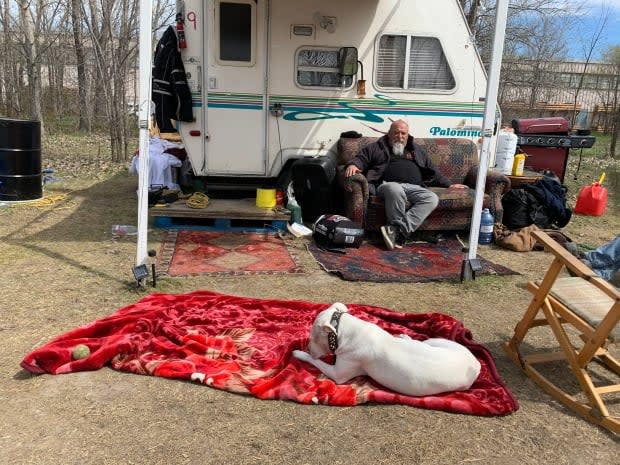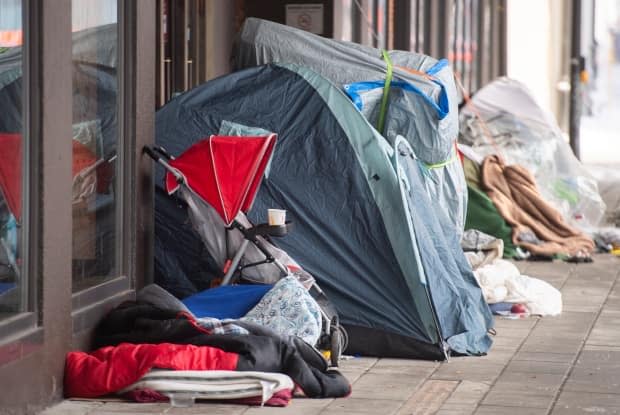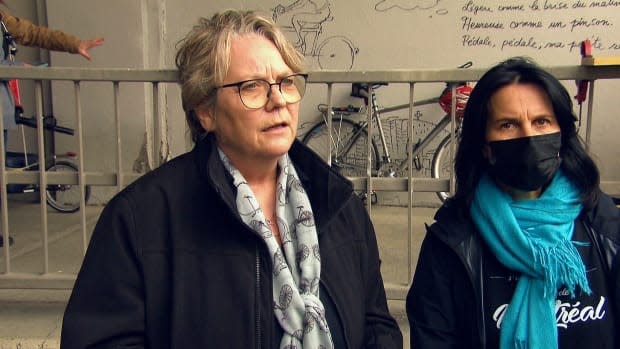New homeless encampment in Montreal's east end served eviction notice

Guylain Levasseur says the 20 or so people living in a motley collection of tents, tarps and campers did everything they could to ensure their setup was safe.
"We have fire extinguishers everywhere," said Levasseur, noting there's even a smoke detector in his camper.
"All the tents have fire extinguishers. The kitchen has one. The camper has two."
Despite all that, the campers living in the small encampment — along with all their furniture, rugs, barbecues and pets — will be evicted Monday.
Back in December, it was ultimately the Montreal fire department that condemned a similar tent city on a roadside green space just east of the Jacques-Cartier Bridge because, with generators and propane on site, it was deemed a fire hazard.
Levasseur said people living in a new encampment, which cropped up a short distance east of that green space, have been working to avoid another eviction.
He said a fire inspector came by and approved the setup, but this time around it's not the fire department that is shutting the camp down — it's Quebec's Ministry of Transport (MTQ).
Camping in industrial area
The camp is on a patch of land known as the Boisé Steinberg by neighbours who have been fighting for years to preserve it for public use, but much of it is slated for industrial development.
A protest is planned for early Monday morning, with advertisements claiming "this vacant lot belongs to no one."
The land shares a boundary with factories, is sandwiched between Hochelaga Street and Notre-Dame Street East, and has a railroad cutting through it.
The MTQ recently warned of the eviction in a short letter distributed to the campers. It claims there are fire safety issues and requests the premises be vacated or the City of Montreal will be asked to take action.

"If you do not comply with this request, all necessary measures to put an end to the illegal occupation will be taken, without further notice or delay," the letter states.
The MTQ told Radio-Canada the land is still used for road work purposes. It is not far from Highway 25.
Officials say resources are available
Chantal Rouleau, minister responsible for Montreal, said the situation with the campers is considered dangerous. She said there are plenty of resources made available in the city and "we cannot tolerate this type of encampment on this land."
Montreal Mayor Valérie Plante said there are beds available for anybody who needs one.
"The only entrance for firefighters has been blocked," said Plante, explaining what makes the situation unsafe for campers.
"There are resources for homeless people," she said. "But this camp, it will be dismantled by Tuesday."
The encampment in the east is, though larger than most others, far from the only one in the Montreal region.
There are thousands of homeless people in the area. Not all have shown interest in temporary emergency beds that, for the most part, come with a laundry list of rules to follow and an early morning checkout time.

Sam Watts, CEO of the Welcome Hall Mission, said the priority should be getting people off the streets and into affordable housing — not just offering homeless people a place to sleep for the night.
"I think it speaks to the fact that we haven't come with enough in the way of permanent solutions that meet everybody's needs. Now, people have freedom of choice. Certainly, there are spaces inside that are available today," he said.
"We've been very good at putting temporary patches on complex social issues. What we need to get better at is bringing short-, medium- and long-term solutions to the problem."
Last month, as this encampment began appearing in the media, Plante emphasized the work her administration is already doing to address this issue.
Plante said that of the 600 social housing units she aimed to create, 80 per cent are already done. Another 250 units are slated to be built in the next two years.

